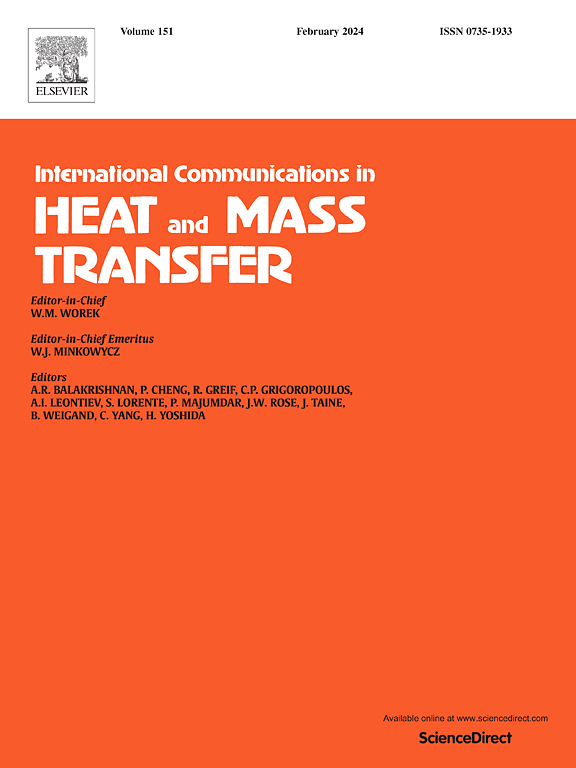Experimental investigation of evaporation and auto-ignition characteristics of lubrication oil droplets
IF 6.4
2区 工程技术
Q1 MECHANICS
International Communications in Heat and Mass Transfer
Pub Date : 2025-03-04
DOI:10.1016/j.icheatmasstransfer.2025.108802
引用次数: 0
Abstract
Auto-ignition of lubrication oil droplets is considered as a possible mechanism of pre-ignition in low-speed two-stroke gas engines. Extending the ignition delay time of lubrication oil can fundamentally postpone the occurrence of pre-ignition. Therefore, investigating the evaporation and auto-ignition characteristics of lubricating oil droplets is essential for pre-ignition inhibition. The droplet suspension technology is employed to examine the impact of ambient temperatures and oil physical parameters (viscosity and alkalinity) on the evaporation and ignition characteristics of lubrication oil. The experimental results indicate that the evaporation process comprises three stages: heating, rapid evaporation, and stable evaporation. Combustion also encompasses three main stages: heating and evaporation, premixed combustion, and diffusion combustion. Lubrication oil droplets with high alkalinity and low viscosity demonstrate shorter evaporation life, faster evaporation rates, and a reduced ignition delay time, which tend to increase the occurrence of pre-ignition. This phenomenon is primarily associated with the rupture and micro-explosion of the droplet during the evaporation process. High alkalinity, low viscosity, and high temperatures promote micro-explosion, leading to a significant reduction in evaporation life and ignition delay time.
润滑油液滴蒸发和自燃特性的实验研究
润滑油滴自燃被认为是低速二冲程燃气发动机预燃的一种可能机理。延长润滑油的滞燃时间,可以从根本上延缓预燃的发生。因此,研究润滑油液滴的蒸发和自燃特性对预燃抑制至关重要。采用液滴悬浮技术研究了环境温度和润滑油物理参数(粘度和碱度)对润滑油蒸发和着火特性的影响。实验结果表明,蒸发过程包括加热、快速蒸发和稳定蒸发三个阶段。燃烧也包括三个主要阶段:加热和蒸发,预混燃烧和扩散燃烧。高碱度、低粘度的润滑油滴蒸发寿命短,蒸发速率快,滞燃时间短,容易增加预燃的发生。这种现象主要与液滴在蒸发过程中的破裂和微爆炸有关。高碱度、低粘度和高温会促进微爆炸,导致蒸发寿命和点火延迟时间显著缩短。
本文章由计算机程序翻译,如有差异,请以英文原文为准。
求助全文
约1分钟内获得全文
求助全文
来源期刊
CiteScore
11.00
自引率
10.00%
发文量
648
审稿时长
32 days
期刊介绍:
International Communications in Heat and Mass Transfer serves as a world forum for the rapid dissemination of new ideas, new measurement techniques, preliminary findings of ongoing investigations, discussions, and criticisms in the field of heat and mass transfer. Two types of manuscript will be considered for publication: communications (short reports of new work or discussions of work which has already been published) and summaries (abstracts of reports, theses or manuscripts which are too long for publication in full). Together with its companion publication, International Journal of Heat and Mass Transfer, with which it shares the same Board of Editors, this journal is read by research workers and engineers throughout the world.

 求助内容:
求助内容: 应助结果提醒方式:
应助结果提醒方式:


